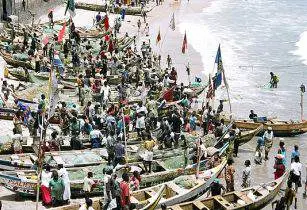Ghana has received US$53.8mn to improve and ensure sustainable management of the country’s fisheries and aquaculture sector
Under the West Africa Region Fisheries Programme, the International Development Association is providing US$50.3mn and the Global Environment Facility is financing another US$3.5mn.
The project is meant to strengthen the country’s capacity to govern and manage its fisheries in a sustainable fashion, reduce illegal fishing and increase the value and profitability generated by fish and aquatic resources.
The beneficiaries from the programme include an estimated 206,000 marine and Lake Volta fishermen, at least 27,000 women fish processors and more than 3,000 fish farmers.
Godfrey Baidoo-Tsibu, head of the monitoring, control and surveillance division of Ghana’s Fisheries Commission said that the decline of the fishing industry in the country is being precipitated by the open access people have to fishing, leading to exploitation and illegal activities.
He said that the government had gathered and analysed data on operations of fisheries, import and export, and had also posted observers and inspectors on industrial vessels to ensure compliance with the law governing fishing.
According to Kwadwo Kyei Yamoah, programme manager at Friends of the Nation, a socio-environmental advocacy NGO, the decline of the fishing industry stemmed from the fact that fishermen were chasing after small fish using unsustainable and illegal fishing methods. He said that some of these illegal methods were the use of light and dynamite for fishing, which deteriorated resources without recourse to sustainability.
Kofi Agbogah, director of Hen Mpoano, an NGO that focuses on reducing poverty and hunger by improving fisheries and aquaculture, said that there was a need to empower the marine police to fight illegal fishing along the coast.





